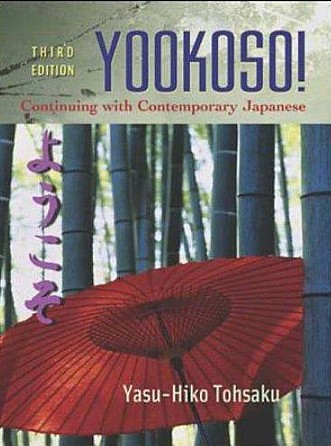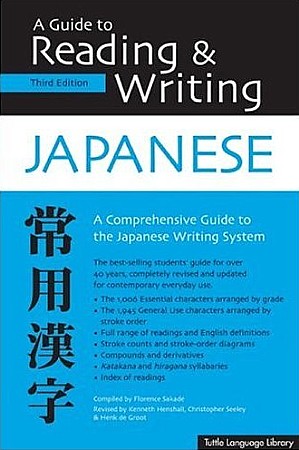
I have now gone half a year without any formal Japanese study after taking it up to advanced level at my university. Although I don’t feel like I’ve forgotten too much yet, what with my daily exposure to anime and my sheer willpower to keep it in my head, I wonder how long I’ll be able to keep it up…
Technically my formal Japanese study ended when I graduated college in June 2009, however I attended a 3-week sightseeing program in Japan in late July/early August 2009. In that short amount of time, I was forced to put all my previous years of Japanese study to the test and it was an excellent experience for me. Unfortunately, since then the only way I’ve been able to keep up my Japanese is by self-study and watching anime.
I’ve been studying Japanese since late 2004 – one and a half years at community college, a month of studying abroad in Kyoto, then a year with no Japanese until I started university, then about two years there, followed by the aforementioned 3-week sightseeing trip. The current job I have requires me to use a little Japanese, but nothing beyond some beginner level vocabulary. I did apply for this year’s JET program but was never selected. AEON and other similar programs have been on my mind but I’ve been having second thoughts about whether living in Japan for that length of time would be good for me right now. I’ve been offering Japanese tutoring services on a few web sites but haven’t gotten any clients. I’ll have to try hanging up fliers at local colleges.
Since graduation, what I’ve been doing is making up my own Japanese review sessions. I’ve been re-studying the intermediate and advance level textbooks I used in college, i.e., I go through each chapter and try to re-memorize all the vocabulary and grammar.

I’ve also been going through one of my kanji dictionaries, page by page, reviewing kanji I know and learning ones I don’t know (the kanji are listed in the order that they’re taught in Japanese schools).

I know the kanji is gonna be a long process, but I think it would be useful for me since I have a pretty good grasp of Japanese grammar and all I really need to focus on is building vocabulary and kanji. My DS kanji dictionary has been indispensable to my studies as well.
And of course, watching anime has always helped me retain an ear for Japanese, although anime is easier to understand than the faster, unrehearsed speech of real life Japan. I occasionally read manga or other anime-related books in Japanese, but one thing I like to do is sing along with anime songs while reading the kanji lyrics on AnimeLyrics.com. The vocabulary of anime songs is limited, but it’s fun anyway.
While all this self-study sounds great, unfortunately in these past six months I’ve had relatively few study sessions. Usually when I’m not working, I get lazy and want to use what free time I have to relax with blog work, games, etc., rather than hit the books. I guess after being a student for the past 20 years, I’m reluctant to start studying again when I don’t have to.
I don’t know any Japanese people to practice my conversation skills with and I’m totally unable mentally and financially to continue my schooling anytime soon, if at all. So it looks like self-study is the only way for me to keep it up. I don’t want to lose my Japanese and waste all those years of college study, so I gotta psyche myself to get back into study mode when I have days off! XD
If anyone wants to offer Japanese self-study tips, I’m all ears.
I’m beginning self study of Japanese myself. What about trying to find a pen pal in Japan to write to, that way you have to write in kanji/kana and can use your knowledge and possibly learn about the culture from a citizen? If that won’t work, do you know anywhere you can get novels written in Japanese (because ordering from Amazon Japan has a hefty shipping price) and try reading those? You could also try tracking your favorite seijuu’s blogs and read online newspapers from Japan to learn about the news (even foreign ones so you can see the “local” news). Obviously, I’m a little biased towards reading (since that’s what I’m focusing on), but what about aiming to study to pass the JLPT higher levels since you have to learn audio clips and such to pass it? Hopefully I’ve given you some good ideas. I’ve just graduated myself (aiming for graduate school now to gain a doctorate) so I know that “not wanting to study anymore” feeling all too well. My problem is that I still want to learn!
What about seeing if you can get the Japanese versions of old Super Famicon games (legal or not legal) and try playing them if you enjoy video games so much. I wouldn’t try the Famicon since it couldn’t handle any kanji, just kana.
@ ultimatemegax
I haven’t been very good at staying in touch with the people I met during my two trips to Japan. But coincidentally, I just wrote a letter (in Japanese) to the place that sponsored my previous trip. Hopefully I’ll get a reply and maybe I can write to them from time to time.
I’ve actually been reading Suzumiya Haruhi no Shoushitsu in Japanese. There isn’t much furigana though so I can’t get a lot of words. But being familiar with the story from reading a translation helps. There’s a Kinokuniya store in downtown LA that I go to every now and then, though lately I’ve been really broke and can’t afford luxury things like Japanese novels and games. I’ll keep Super Famicon in mind.
I passed JLPT level 3 in 2007 but I haven’t taken it since. I’ve heard about how much harder it gets in levels 2 and 1. But I should give it a try again if I can remember to sign up and find some way to get out to the test site.
Anyway, thanks for the tips. Good luck with your studies, too.
Oh, and don’t get me wrong – I LOVE learning, pretty much any subject really. I’m one of the few people who loved attending just about all my college lectures. I just don’t like tests and writing papers, which is what higher schooling is all about.
Recommendation: Join a translation group as either translator or cross-language proofreader/editor. The rest of the group should pester you enough to keep you from being lazy. A fansubber/scanlation group might work, but a light novel trans group would be even better since the job involves a much larger variation of words.
Self-studying rarely keeps up once we get out of school, not lest you have tremendous willpower (or genuine love for learning languages) anyhow.
@ Aorii
Thanks, I’ll think about it. I do have the willpower to keep Japanese in my head (I think I do, at least), but practicing it by way of translating would be a big help. I don’t really like the pressure of having a schedule, which fan translation usually requires, but it would help keep me from procrastinating.
I’ve also been thinking a lot about how to continue my Japanese language studies. My studies have consisted of Japanese classes taken sporadically, with large gaps of time in between during which I do basically nothing to keep it up (except watch anime, of course). You’re a lot further along than I am with Japanese, but maybe there’s some way we can help each other with this. (I’ve also got some Japanese manga I can let you have the next time I see you.) I’ll put my thinking cap on and email you soon with some ideas.
@ Jan
Yeah, we should help each other out. I’ve had my self-study sessions maybe just three or four times in the past bunch of months – mostly watching anime is all I do to keep it up. I have some manga in Japanese too (many Inuyasha volumes, Azumanga Daioh, Kannagi) but I’m really lazy when it comes to reading them. It’s too bad we live a bit too far from each other to do some kind of weekly practice/study session. But maybe we can do something online. I’ll give it some thought, too =)
I graduated just in December with a BA in Japanese and a minor in Asian Studies.
I’ve been keeping up with my Japanese daily. Mostly because I don’t have a job, but I’d do it anyway. Basically, I just grind vocabulary. I’ve learned about 4000 words in a year, which I probably should have been learning while in college… I’ve found that I know the grammar but hell if I know whatever is being said. I need to start reading more articles and such in the language though.
For advice, I’d say you’re wasting your time with Kanji unless it’s to learn how to write them. Personally, I think it’s better to just learn vocabulary instead because where the hell are you ever going to see a given Kanji alone? Also, Anki. Use it. It’s basically what you should be using to show that you’ve memorized a word so you’re not wasting your time. You can also use it for your sentence mining and even Kanji writing.
Also, definitions should be in Japanese or eventually as such so you start thinking Japanese words in the Japanese language. I started using Japanese to Japanese recently and damn it’s awesome.
And finally AJATT. Just do what you like doing in English but in Japanese.
If you want to discuss further about things to do I would be open to it. Japanese language is something I’m really passionate about and I like helping people out because I know how it is. I just wish a lot of the other people I knew who were in my major had the same kind of motivation and passion. A language is a life skill you can’t just expect to wake up one day and learn it. Gotta be active. Sadly, I didn’t realize this until maybe a year before I graduated.
Sorry for the tl;dr
@ Koji Oe
The reason I’m learning kanji is so I can read, since furigana is rare. I try to practice writing them, but as long as I can recognize them in words and know some of their pronunciations, that’s what I’m going for. As I’m going through the kanji, I’m learning words that have that kanji, so I’m building vocabulary at the same time.
Never did Anki or AJATT before. I’ll have to give them a try. Thanks for bringing them to my attention.
There’s a much better method for learning kanji:
http://kanji.koohii.com/
And check out:
http://www.alljapaneseallthetime.com/blog/lazy-kanji-cards-an-ajatteer-shares-a-personal-status-report#comment-37226
Have you tried lang-8? It’s a site where you keep journals in whatever language you’re studying in and lets native speakers correct your mistakes (if you make any). It’s a bit tedious at first but it’s definitely good for practice!
@ kendo
Thanks for the links.
@ nqminh 146
My Japanese teacher in college told us about Lang-8. I haven’t gotten around to trying it out yet, but I plan to eventually.
“I’ve been offering Japanese tutoring services on a few web sites but haven’t gotten any clients.”
How much do you charge? I’ve been looking for someone who could help me proofread my grammar notes for JLPT 2. I browsed almost everywhere, but the prices they ask, is simply not in my budget. T-T
@ mireille
I charge $20 an hour for tutoring, but that could change depending on the exact work you want me to do. E-mail me if you want to discuss more.
A tool I use is lang8.com. You pick a language and write journal entries and they are corrected by native speakers. Then you can correct their English journals. It’s GREAT and FREE!